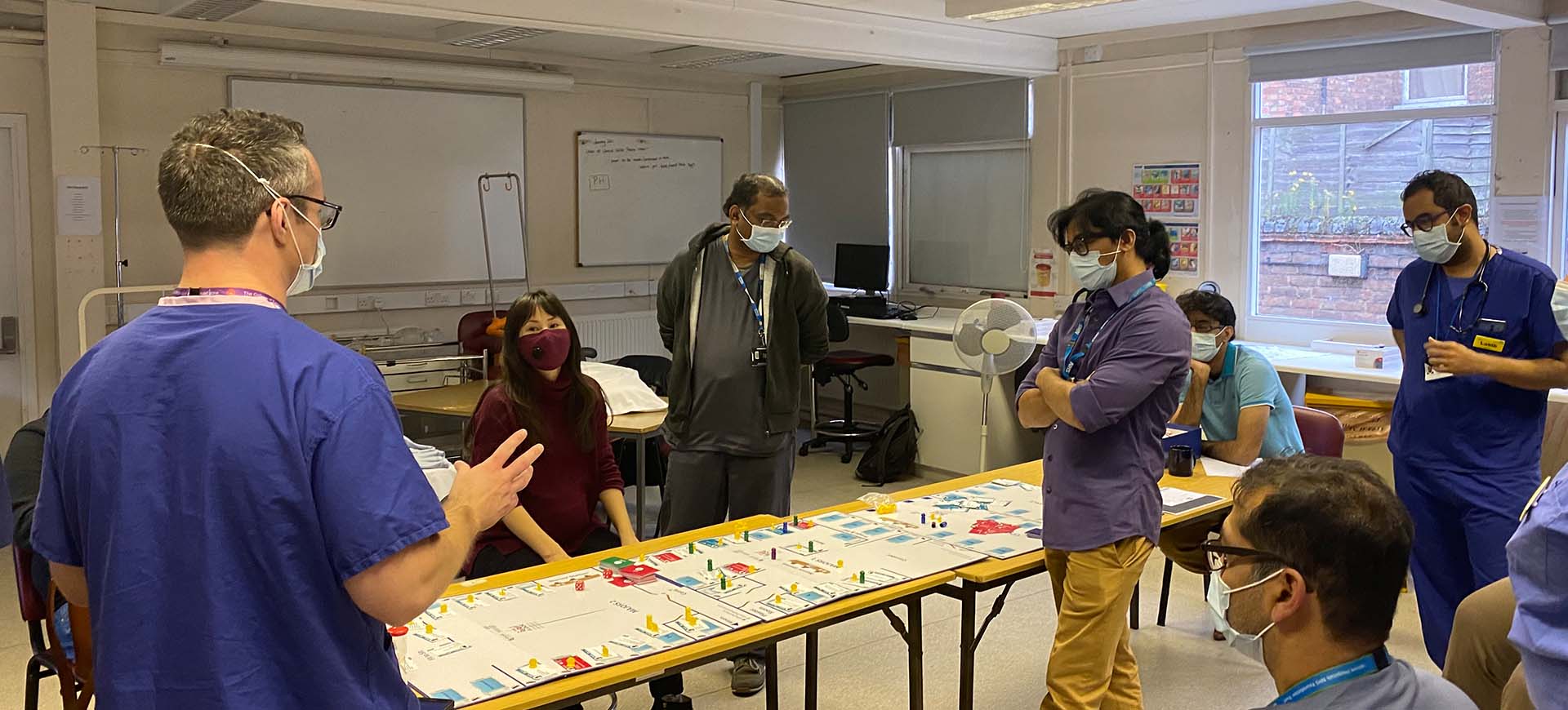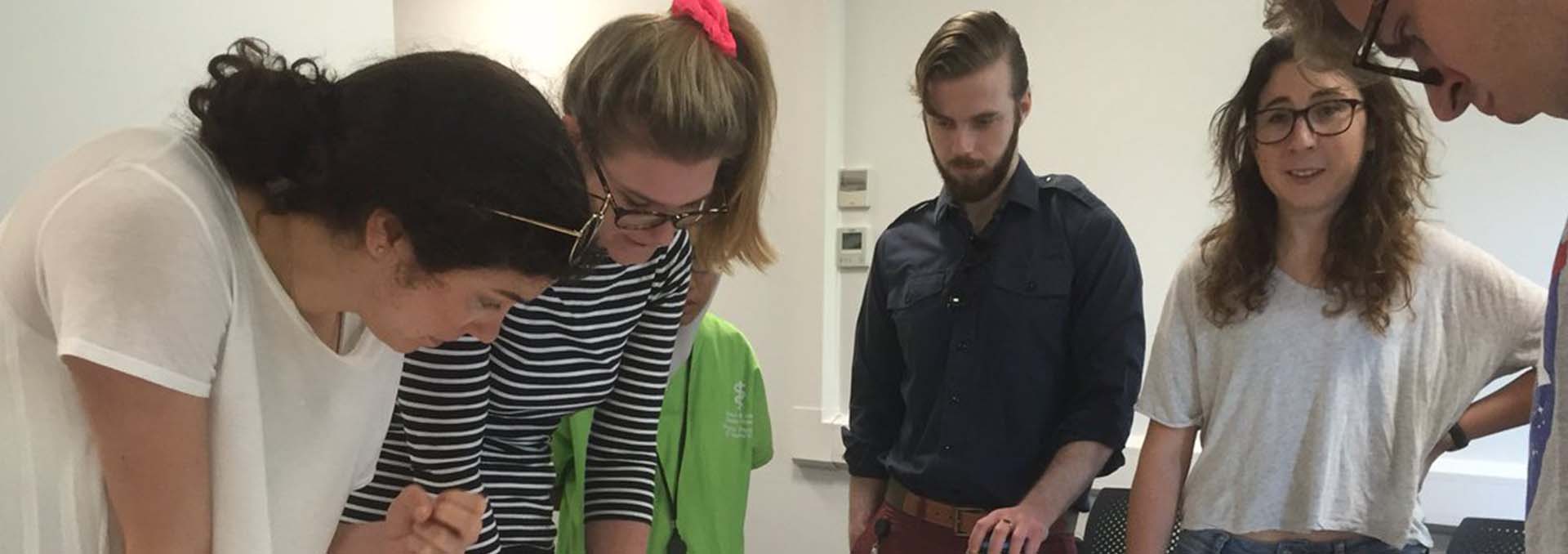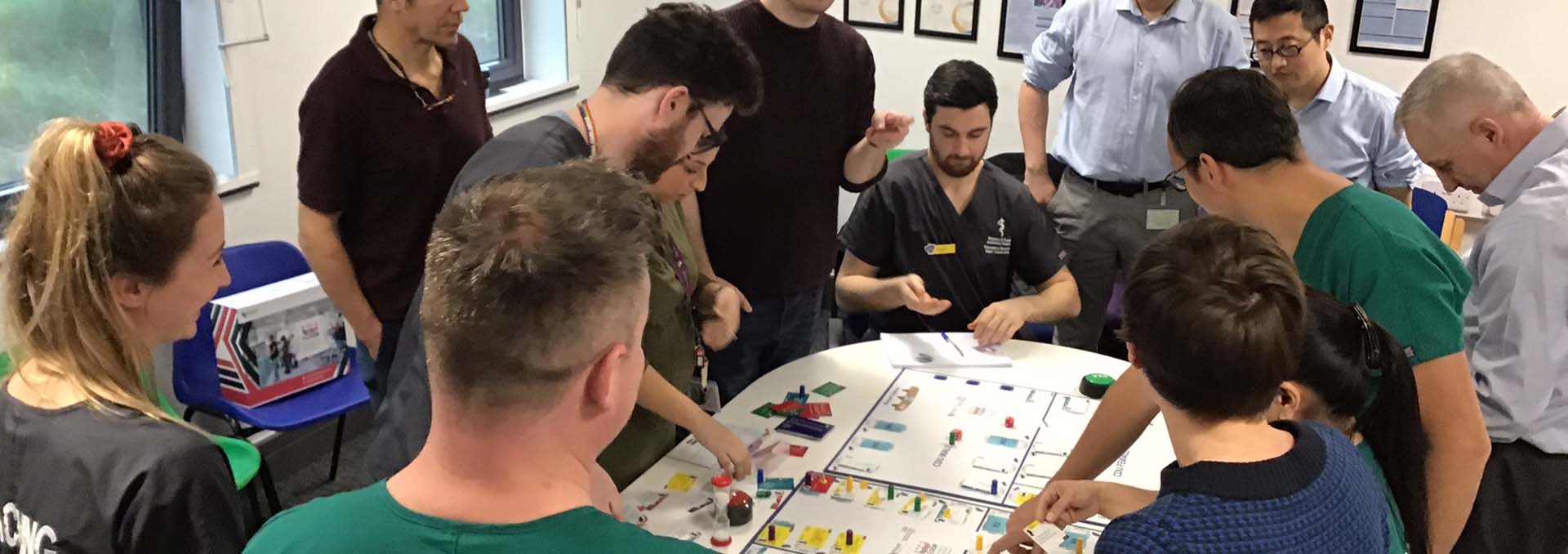Over the past 2 years several hundred people have played The Floor. Here is what some of them thought of the experience:
"This is truly a nail-biting game! All operational staff should play this. It's a rollercoaster!"
Dame Marianne Griffiths, CEO, Western Sussex Hospitals NHS Foundation Trust & Brighton and Sussex University Hospitals NHS Trust.
"A really good game which helped me understand the management pressures on the ED and also helped with decision making under stress. On top of that it, created a sense of intensity…which matched the working environment and was good fun! Would definitely recommend."
Rachel Tresman, ACCS CT2 (Anaesthetics).
"I learnt a lot about the difficulties and challenges faced by ED Consultants - it was really good to observe and understand the operational and clinical challenges"
Peter Landstrom, Chief Delivery and Strategy Officer, Western Sussex Hospitals NHS Foundation Trust & Brighton and Sussex University Hospitals NHS Trust.
"This game is great at simulating the actions undertaken in a major incident and it has become an integral part of our major incident training."
Justin Walford, Senior Practice Development Nurse, Charge Nurse, Brighton and Sussex University Hospitals NHS Trust.
"I don't work in A&E, but it brought it home - which will be incredibly useful in both making decisions as a Director and when Director On Call"
Denise Farmer, Chief Officer of Workforce and Organisational Development, Western Sussex Hospitals NHS Foundation Trust & Brighton and Sussex University Hospitals NHS Trust.
"I am a first-year medical student. I thought that the game was a brilliant simulation of the stresses that we face in A&E on a day to day basis, whilst at the same time being really enjoyable to play. It was also a great team-building exercise"
Zac Lanza, 1st year Medical Student and HCA, Leeds University.
"It’s great fun and provides good insight to the unexpected nature of a major incident. Also great for team bonding and being able to ‘think ahead’ and plan how you as a team would deal with certain situations and what practices would need to change slightly to cope with the pressures. Very enjoyable."
Gemma Davy Green, Senior ED Sister, Brighton and Sussex University Hospitals NHS Trust.
"I found this really useful as the CBRN/ MI lead nurse for ED, to use as a teaching tool for the nurses. I think it’s a great way to get people thinking about the difficult decisions they will be required to make and think outside the box."
Chantel Villiers, Major Incident Lead Nurse, Senior ED Sister, Brighton and Sussex University Hospitals NHS Trust.
"I found this an extremely useful, interactive way of learning how we can cope with the department during a major incident. It replicates an ED layout and so gives a better understanding. Would recommend highly!"
Debbie H, Junior ED Sister, Brighton and Sussex University Hospitals NHS Trust.
"I was very impressed when I played ‘The Floor’ during a study day. The set up was excellent and it showed an overall layout of our Unit. I was able to see what was going on in the other depts in A&E, which you can’t always see when you are so focused on the area you are working in at the time. It was a good problem-solving exercise for me."
Debi McColl, Junior ED Sister, Brighton and Sussex University Hospitals NHS Trust.
"It's a great game/learning tool which I found particularly useful when starting out as a band 7 (to complete it alongside another, more senior band 7 helped to see how they would tackle different situations)"
Katie Durrell, Junior ED Sister, Brighton and Sussex University Hospitals NHS Trust.

During testing of the original game participants were asked to share their thoughts after they had played The Floor. The participants were doctors, nurses, support staff and managers. Here are their answers to this question:
What have you learned about managing an emergency department?
July 2019
1. Fantastic game, certainly got people thinking, thank you so much.
2. That a nurse should be co-ordinating the department.
3. Identifying problems and organising roles.
4. Just how difficult it is and to see the department from a managerial perspective, not just an SHO seeing individual patients.
5. Thinking laterally – create solutions to problems.
6. Importance of communication, commanders, consultants, pre-exercise plans and practice.
7. How to escalate & not just cope.
8. Transfer the model to busy labour wards.
9. It is hard.
10. Pressures can compromise patient safety.
11. It’s not just about the medicine.

February 2019
1. Importance of resource allocation and management skills in an EM career.
2. As an SHO you appreciate just how hard it is.
3. Needs practice – would definitely recommend to colleagues.
4. Keep up this amazing concept.
5. Think outside the box.
6. Very stressful for people in charge.
7. Resource utilisation.
8. Good to have challenges thrown at you, like it would be in real life!
9. Stressful = more empathy for seniors.
10. Lots of knock-on effects to decisions made.
11. Situational Awareness, Multitasking, resource management.

October 2018
1. Understand some of the difficulties and challenges faced by ED Clinicians. Really good to observe and understand operational/clinical challenges.
2. Complexity and pressure.
3. Understood how important coordinator is and how stressful it can be.
4. Multitasking, prioritising, need for good co-ordination, management of stress.
5. I hope I never have to do it!
6. It is very hard and highly dependent on so many variables.
7. Terrifying – it is even harder than thought.
8. Complexity/stress/dependency upon admitting in rest of hospital.
9. The compounding of issues was surprising.
10. It was amazing!

September 2018
1. Have to be ready for the unexpected. Use all members of your team.
2. Managing flow, investigations, delegating. Discussions not micromanaging.
3. I don’t work in A&E but this…will be incredibly useful in both making decisions as a director and when acting as director on call.
4. Try to make use of other areas.
5. So much to think about, even without having to make medical decisions.
6. Escalation where appropriate.
7. How to juggle difficult tasks and ensure patients are seen.
8. Good insight into the challenges.
9. Multiple challenges and pressure, different tactics for improving flow.
10. Everyone should play it.


